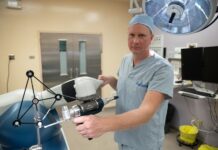SURGEONS at Burnaby Hospital say they have lost confidence in the management of Fraser Health Authority (FHA) surgical services and are calling for changes to deal with the hospital’s unacceptably long surgical waitlists.
Many of the surgeons at Burnaby Hospital, as well as other medical staff, have even come to believe that the hospital and its patients would be better served if the facility was under the wing of another health authority that could show more concern for the citizens of East Vancouver and Burnaby served by the hospital, such as Vancouver Coastal Health or Providence Health Care.
Dr. David Jones, Burnaby Hospital’s former medical director and part of the surgical team, said on Monday the FHA has unfairly tried to place the blame for long surgical waitlists at Burnaby Hospital on the surgeons. He pointed to repeated requests by Burnaby Hospital surgeons for a fair share of FHA funding resources; funding that would allow the hospital to open several currently empty operating rooms and reduce the waitlist.
“Only six of the 10 operating rooms at Burnaby Hospital are being staffed and utilized,” Jones said. “We have repeatedly documented the lack of resources that Fraser Health provides to Burnaby Hospital compared to other FHA sites. We’ve repeatedly asked for more resources to open more operating rooms so we can clear the backlog of patients on the waiting lists.”
In May of this year, an article in the Burnaby NewsLeader documented the fact that surgical wait lists at Burnaby Hospital are the longest of any hospital in the Lower Mainland.
As examples, the wait time at Burnaby Hospital for gallbladder surgery (cholecystectomy) is 58.5 weeks but only 10.8 weeks at Surrey Memorial. The wait for prostate surgery (61.6 weeks at Burnaby Hospital compared to 28.6 weeks at Surrey Memorial), abdominal hernia surgery (56.7 weeks compared to 24.1 weeks), and ACL knee surgery (84.7 weeks compared to 23.1 weeks) is similarly longer. See https://swt.hlth.gov.bc.ca/faces/AdultFacilityProcedure.xhtml
Jones said the sharp difference seen in surgical wait times between Burnaby Hospital and Surrey Memorial is not surprising considering the fact that the FHA provides only half the amount of funding to Burnaby Hospital’s operating rooms as it does to the operating rooms at Surrey Memorial.
“I cannot help but wonder how the FHA feels that it is okay for a cholecystectomy patient in Burnaby or East Vancouver to wait six times longer than in Surrey,” Jones said. “The provincial waitlist data clearly shows the FHA is failing to provide adequate resources to Burnaby Hospital to serve patients.”
The FHA recently directed surgeons to review all bookings of patients on their surgical waitlist who have been waiting for longer than 40 weeks. The directive was an attempt by the FHA to avoid fines for failing to provide timely access to surgery.
“Making patients come in again to the surgeon’s office shows disregard for the patient’s time and wastes precious healthcare resources while adding additional cost to the Health System in the form of doctor’s visits and repeated tests,” Jones said. “The FHA wants to manipulate the surgical waitlist to artificially decrease the numbers. What we need is a health authority that adequately funds surgery at Burnaby Hospital to fix people not the numbers.”
Jones said even if a patient being “reassessed” did not go back on the wait list at week one, as the FHA now insists would not happen, and simply returned to the list at week 40, the FHA will have saved four to five weeks while the patient is off the list being re-assessed by the surgeons.
He added that the time involved in reassessing patients would also have the effect (possibly intentional on the part of the FHA) of redirecting the attention of surgeons away from seeing new patients who might then add to and increase surgical waitlists.
In a letter to Dr. Peter Blair, the FHA Surgery Program Medical Director, Burnaby Hospital surgeons stated that they have lost confidence in the management of FHA surgical services and called on Blair and the FHA to rescind the waitlist directive and instead provide adequate resources to Burnaby Hospital to reduce surgical wait times (see: http://www.taxpayer.com/media/burnaby%20fha%20letter.pdf ).
Jones pointed to a November 27 article in the Vancouver Sun which reported that “the Fraser Health Authority is asking its surgeons to operate SOON [our emphasis] on patients who have been waiting more than 10 months.” Jones says the insinuation is that doctors alone have the ability to book surgeries more quickly and reduce wait lists. In fact, he says, it is solely the FHA that has the authority to open more operating rooms to bring Burnaby Hospital’s surgical waitlists in line with others in the Lower Mainland.
“It is quite evident from the waitlist numbers that the people of East Vancouver and Burnaby wait too long for their surgery,” Jones said. “Dr. Blair unfairly discounts the funding difference between Burnaby Hospital and Surrey Memorial by stating that Surrey is a regional hospital. Are the 465,000 people of East Vancouver and Burnaby not a region?”
Jones said even the Minister of Health, after seeing data from a recent review of the FHA ordered by the minister, has suggested that Burnaby Hospital might be better able to serve patients if it was transferred to Providence Health Care or Vancouver Coastal Health. Many at the hospital agree (see: http://www.burnabynewsleader.com/news/266475701.html?mobile=true ).
Burnaby is the second fastest growing and the third largest city in B.C. Burnaby Hospital serves approximately 10 percent of the province’s population, a population similar to Surrey’s 468,000 people.
Nearly 40 percent of the patients served by Burnaby Hospital live in East Vancouver, an often overlooked fact. That percentage jumps to as high as 80 percent each night after 8 p.m. when the Emergency Room at Mount Saint Joseph Hospital closes.
From April 1 to November 6, Burnaby Hospital performed 4,280 surgeries compared to Surrey Memorial Hospital’s 4,358 surgeries, with only half of the funding.














